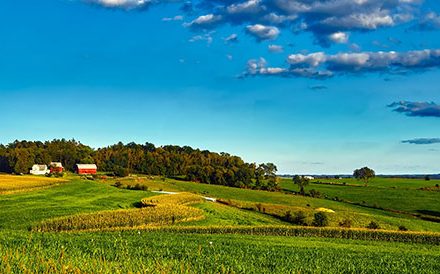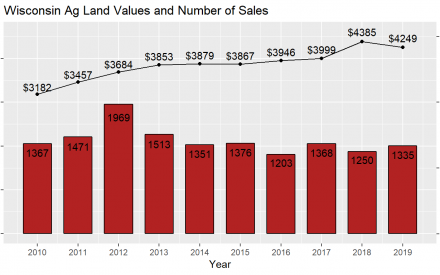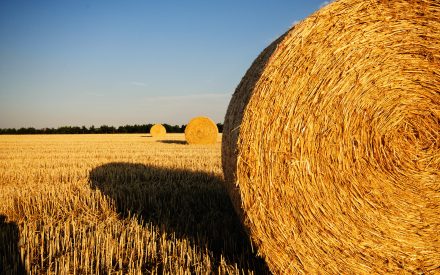Rental rates and lease agreement questions often arise in the fall. Landowners or renters are looking for a lease agreement template that they can plug their values into. While such lease agreements exist they do not necessarily cover all factors that should be in a lease agreement.
Types of lease agreements
Before entering into a lease agreement it is important to determine the type of lease you will enter into:
- Flex agreement
- Crop share lease
- Cash lease
In Wisconsin a cash lease is by far the most popular, but not the only option. Your lease can be a combination of the above lease types.
The Wisconsin Cash Farm Land Lease Example outlines the major items that need to be in cash agreement. These include:
- Contracting parties and date
- Property description
- General terms of the lease
- Land use
- Payments and due dates
- Termination/ amendment of agreement
- Signatures
Defining Expectations
Successful lease agreements also include management expectations. Farm businesses are most resilient when they have a thorough discussion with the landlord/tenant and come to a robust, authentic agreement. Asking some questions up front regarding management expectations by each party will guide discussions towards a resilient lease agreement.
According to Farm Commons, the following are just a few guiding questions to help parties build a more robust agreement.
Basics: When does the lease begin and end?
Rights: What activities is the farmer allowed to engage in? What are the limits? Can the farmer sublease? If damage is incurred or a party has lost revenue because of another party’s actions, should the other party be compensated and how?
Production-related: Are there limits to the type of production or methods? Conservation practices or organic? Are there specific standards for weed or disease control? Grass waterways etc.?
Facilities: Who is responsible for maintenance and costs, or utilities that may be associated?
Renewal: Does the lease renew automatically or do specific steps need to take place by either party? If the lease renews automatically, when and how does either party give notice that they do not want to renew the lease.
Communication: Should there be annual meetings and what topics should be discussed?
Be specific
Probably the most important thing to consider when entering into a lease agreement is what happens to the crops if they cannot be harvested by the termination of the lease. For example if the lease runs from January 1st – December 31st and we have a wet year that does not allow the renter to harvest the crops without damaging the field, is there a provision that gives him until sometime in the spring to get them off?
When constructing a lease agreement it is important to remember that it is a negotiation. If there are parts of the lease that that owner or the renter does not agree with there should be a conversation. Neither side should feel obligated to sign a lease without having a conversation about all the items in it.
When drafting a lease agreement it is important to be specific. Outline what specifies a default on the lease agreement. Is this nonpayment for 3 months, is it not following conservation practices outlined in the lease. It is important to outline what will happen in the event of a termination, is the tenant given 30 days notice or 60 days notice?
Documentation
If leasing land is a large part of your farm business then it may be beneficial to have a lawyer draft a lease agreement for you. To save money you can have them draft you a template lease agreement that can be used with multiple tenants or owners. It is often cheaper to have the lawyer draft something from scratch than to have them review something you attempted to draft yourself.
People forget what they said over time in verbal agreements, and details can be overlooked. Therefore, it is important to thoroughly explore and document expectations in writing. Each lease agreement is unique to the expectations defined by the parties involved.
State laws on land leasing are a backstop for when farm tenants/landlords do not come up with their own agreement. If parties involved in an agreement are experiencing issues, damages have been incurred, or are in disagreement, it is important for the parties to involve a legal attorney.
Recording a lease
The last item to consider is if you will record the lease with the County. While this is not usually done, there is some benefit to doing it. If the land is sold and the lease has been recorded then the new owner has to honor the lease. However, if the lease was not recorded then the new owner may not know the lease existed and does not have to honor the lease. In this situation the tenant could go after the previous land owner for breach of contract.
Overall, when drafting a lease either as the tenant or the land owner it is important to consider every detail of what you want and make sure it is clearly described in the written lease agreement.


 Wisconsin Cash Farm Land Lease Example
Wisconsin Cash Farm Land Lease Example Navigating Lease Agreements for Small Acreage, High Value Crops
Navigating Lease Agreements for Small Acreage, High Value Crops Wisconsin Agricultural Land Prices 2021
Wisconsin Agricultural Land Prices 2021 Guidance in Determining an Equitable Agriculture Land Rental Value
Guidance in Determining an Equitable Agriculture Land Rental Value


